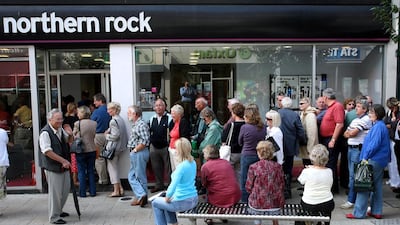Ten years ago this week Britain witnessed a run on Northern Rock, an event which sent ripples of panic through the whole financial and political systems. The prime minister, Gordon Brown, described it later as his worst moment in Downing Street, and he, along with many others, will never forget the image of pensioners and savers, armed with flasks of tea and deckchairs, queuing for days outside the bank’s branches.
Bank runs are scary things and if this one had not been contained, Mr Brown wrote, it could quickly have spread to the other banks, ATMs would soon run out of cash, credit cards wouldn’t work, and within days people would struggle to put food on the table. Riots and social unrest and breakdown would soon follow.
Northern Rock was Britain’s first bank run in over a century and, amazingly, the only bank run in any developed country during the financial crisis. Tim Geithner, chairman of the New York Fed at the time, feared it would spread to the US where there were banks which appeared a good deal more vulnerable than Northern Rock. But he took action to cut it off, the Bank of England didn’t and the rest is history.
_______________
Read more:
UK lenders plan to close record 762 branches as banks pivot towards digital space
RBS looks to Amsterdam as post-Brexit home
_______________
The extraordinary thing about this story is that it has a happy ending, or at least happy for some. It now emerges that the UK government, which provided emergency funding of £37 billion for Northern Rock and then nationalised the stricken bank, has effectively got all its money back and will actually make a profit.
No Northern Rock depositor lost money – the government’s last-minute rescue saw to that. But shareholders were wiped out, as they invariably are when a company goes bust. That’s the difference between risk capital and deposits. Now they feel it was they who got the raw end of the deal. The UK Treasury has sold off most of the Northern Rock assets, essentially mortgages on houses all over the country, and recouped most of its £37bn of funding it made available. It is now left with a debt of £4.6bn, owed to it by NRAM, the body it set up to manage the bank’s loans. The assets that remain are worth a good deal more than that.
Whoever would have forecast that when the run was at its height? Certainly not the seriously rattled denizen of Number 10 Downing Street or his equally panicky neighbour, the chancellor Alastair Darling. No one was thinking of making a profit then,
Shareholders of course haven’t a chance of getting their money back. If the government hadn’t intervened, Northern Rock would have been bust within hours and shareholders would have got nothing anyway. The last thing in the world Gordon Brown wanted, as he confessed himself, was to nationalise a bank – even Old Labour had never done that and Mr Brown was determined that his New Labour government would avoid it at any cost. When all his efforts to find a buyer for the carcase failed, he actually insisted on changing the word “nationalisation” in the press release to “taken into temporary state ownership”, and announced his intention of privatising Northern Rock again as soon as possible.
The bank was then broken into a "good" bank, which was sold to Virgin Money, and a "bad" bank, all the unrealisable assets and loans, which were left with the government. Losses on those assets, largely consisting of mortgages which Northern Rock offered at apparently reckless rates – up to 125 per cent of a house's value on up to ten times a mortgagee's salary – was expected to be huge. Yet remarkably few homeowners defaulted, bad debts have been well below expectations and the Northern Rock book turned out to be a relatively good one. So, the government, a most reluctant investor, ends up with a handsome profit and shareholders lose all. C'est la vie.
There are many lessons to be learned from this, not least that state intervention is not always a bad thing. The government also made a (modest) profit on the £22bn it pumped into Lloyds/HBOS a year later, although it will never recoup all the £57bn it pumped into RBS. It also took a number of other former building societies, such as Bradford & Bingley, into state ownership and has recouped its investment there. In all cases, depositors were saved, most of the banks survived to fight another day (Lloyds is today the biggest financial institution in Europe), and, most importantly of all, the financial system survived.
The biggest lesson however is that there never should have been a run on Northern Rock in the first place – and there wouldn’t have been if the Bank of England had provided it with funds at the outset. It was a fundamentally healthy bank which unfortunately relied too heavily on the wholesale and securitisation markets which dried up when the sub-prime crisis broke. Lloyds wanted to save it but the Bank’s governor, Mervyn King, refused to support it, quoting his widely discredited principle of “moral hazard” – if he bailed out Northern Rock, he insisted, other banks could behave even more recklessly knowing they had the same safety net.
A week later he had to turn tail and pump in the funds anyway.

